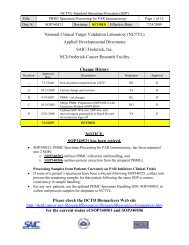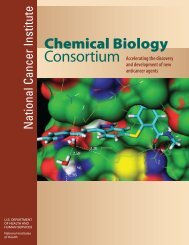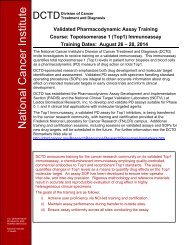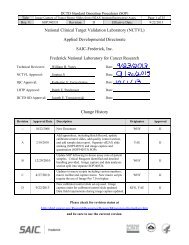National Cancer Institute - NCI Division of Cancer Treatment and ...
National Cancer Institute - NCI Division of Cancer Treatment and ...
National Cancer Institute - NCI Division of Cancer Treatment and ...
Create successful ePaper yourself
Turn your PDF publications into a flip-book with our unique Google optimized e-Paper software.
DCTD has six major programs that work<br />
together to bring unique molecules<br />
from the laboratory bench to the patient<br />
bedside:<br />
■ Biometrics Research Branch (BRB)—<br />
provides state-<strong>of</strong>-the-art statistical <strong>and</strong><br />
biomathematical analyses for DCTD<br />
<strong>and</strong> other <strong>NCI</strong> components <strong>and</strong> performs<br />
research in the areas <strong>of</strong> statistical,<br />
mathematical, <strong>and</strong> computational<br />
sciences that is motivated <strong>and</strong> informed<br />
by real <strong>and</strong> important problems in<br />
current cancer research. Branch members<br />
provide leadership for the DCTD<br />
national research programs by formulating<br />
biomathematical approaches for<br />
analyzing genomic, proteomic, metabolomic,<br />
<strong>and</strong> other data emanating from<br />
the developmental therapeutics, diagnostics,<br />
imaging, radiation research,<br />
<strong>and</strong> clinical trials programs.<br />
■ <strong>Cancer</strong> Diagnosis Program (CDP)—<br />
strives to improve the diagnosis <strong>and</strong><br />
assessment <strong>of</strong> cancer by effectively<br />
moving new scientific knowledge into<br />
clinical practice. This program stimulates,<br />
coordinates, <strong>and</strong> funds specimen<br />
resources, databases related to those<br />
specimens, <strong>and</strong> research on diagnostics<br />
<strong>and</strong> improved technologies to better<br />
characterize tumors, so that cancer<br />
patients <strong>and</strong> their physicians can have<br />
access to a broader range <strong>of</strong> diagnostic<br />
information as they make clinical<br />
decisions. The laboratory tools CDP<br />
develops also help to maximize the<br />
impact <strong>of</strong> cancer treatments.<br />
■ ■ ■<br />
DCTD scientists support programs to pursue high-risk research<br />
that may yield great benefits for patients with cancer but may be<br />
too difficult or risky for industry or academia to undertake.<br />
■ <strong>Cancer</strong> Imaging Program (CIP)—<br />
unites researchers in a team approach<br />
from disciplines as diverse as radiology,<br />
bioengineering, biology, chemistry,<br />
<strong>and</strong> physics. The program encourages<br />
researchers to integrate new imaging<br />
discoveries <strong>and</strong> developments into the<br />
study <strong>of</strong> cancer biology <strong>and</strong> into the<br />
clinical management <strong>of</strong> cancer <strong>and</strong><br />
cancer risk. This translational research<br />
program is using new technologies to<br />
exp<strong>and</strong> the role <strong>of</strong> imaging in noninvasive<br />
diagnosis, identification <strong>of</strong> disease<br />
subsets in patients, disease staging, <strong>and</strong><br />
treatment monitoring. CIP supports<br />
<strong>and</strong> advises innovative developers in<br />
academia <strong>and</strong> private industry as they<br />
create the next generation <strong>of</strong> imaging<br />
technology, including molecular probes,<br />
optical technology devices, <strong>and</strong> new<br />
contrast agents.<br />
■ <strong>Cancer</strong> Therapy Evaluation Program<br />
(CTEP)—functions as <strong>NCI</strong>’s primary<br />
clinical evaluator <strong>of</strong> new anticancer<br />
agents. Program staff members play<br />
a critical role in selecting promising<br />
agents to enter human clinical trials.<br />
In addition, the program evaluates<br />
new radiation <strong>and</strong> surgical methods,<br />
identifies biomolecular characteristics<br />
<strong>of</strong> malignant tumors that investigators<br />
may be able to exploit clinically, <strong>and</strong><br />
administers the 11 cooperative research<br />
groups that unite researchers around<br />
the nation <strong>and</strong> the world in the pursuit<br />
<strong>of</strong> distinctive <strong>and</strong> effective new treatments<br />
for cancer. CTEP accomplishes<br />
its goals by administering, coordinating,<br />
<strong>and</strong> funding clinical trials, as well<br />
as sponsoring other research. The<br />
D I V I S I O N O F C A N C E R T R E A T M E N T A N D D I A G N O S I S ■ 3










